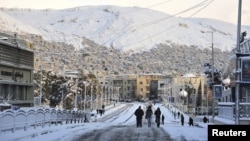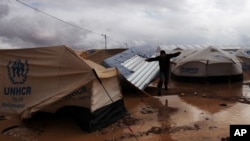JERUSALEM —
A winter storm in the Middle East has brought heavy snowfall and flooding and caused at least eight deaths. The storm, called the worst in more than 20 years, disrupted life across the region and deepened the misery of hundreds of thousands of Syrian refugees.
Weather experts say the storm dumped the precipitation of an entire average winter during the course of just a few days.
The storm paralyzed life in many cities from Gaza to Istanbul and aggravated the hardship of Syrians already suffering from nearly two years of conflict.
Desperate situation
People who remained in Syria's war-battered cities huddled in their homes, making fires from books and furniture because of a lack of fuel for heaters.
The situation was even worse for hundreds of thousands of Syrian refugees who have fled into neighboring countries and the one million people displaced inside Syria. An elderly refugee in a camp in Lebanon, who would not give her name, said they face death every day.
"We are 10 people living in a tent near the woods. I have asthma. My children go to fetch wood, but it is wet. We are suffering. This is a tragedy," she said.
The United Nations says millions of people inside Syria and 600,000 refugees outside the country need assistance, including food, blankets and warm clothes. It has appealed for $1.5 billion in aid for the coming six months.
Widespread snow cover
The storm created havoc across the region. It blanketed cities such as Jerusalem, Ramallah, Amman and Damascus with up to 15 centimeters of snow. Rural areas in Jordan and northern Israel were paralyzed by up to 30 centimeters of snow.
Officials shut down public transportation, schools and public offices. Many businesses did not open because employees could not get to work.
Israel's main highway was closed outside Jerusalem due to poor road conditions. Roads were closed in much of northern Israel and the Golan Heights.
Thursday's snow storm was preceded by four days of winter rain that caused flooding in many areas.
The main highway into Tel Aviv was closed Wednesday because of flooding which also shut down train service to Israel's largest city.
State of emergency
Palestinian authorities in Ramallah announced a state of emergency, saying hundreds of people had been injured and hundreds of homes had been flooded in the West Bank.
Parts of southern Gaza also were flooded.
Egyptian officials said heavy downpours, high winds and low visibility disrupted shipping traffic through the Suez Canal and led to the closing of several Egyptian ports.
For those who received an unexpected day off from school or work, though, the storm provided a rare occasion to enjoy sledding or a snowball fight.
Israel's 89-year-old president, Shimon Peres, ventured outside to place a hat on a snowman.
“It is so rare, so beautiful, so unifying. Whatever happens in Jerusalem is a blessing. This time it's a blessing in white,” said Peres.
Forecasters said the harsh weather is expected to ease in the coming days.
Weather experts say the storm dumped the precipitation of an entire average winter during the course of just a few days.
The storm paralyzed life in many cities from Gaza to Istanbul and aggravated the hardship of Syrians already suffering from nearly two years of conflict.
Desperate situation
People who remained in Syria's war-battered cities huddled in their homes, making fires from books and furniture because of a lack of fuel for heaters.
The situation was even worse for hundreds of thousands of Syrian refugees who have fled into neighboring countries and the one million people displaced inside Syria. An elderly refugee in a camp in Lebanon, who would not give her name, said they face death every day.
"We are 10 people living in a tent near the woods. I have asthma. My children go to fetch wood, but it is wet. We are suffering. This is a tragedy," she said.
The United Nations says millions of people inside Syria and 600,000 refugees outside the country need assistance, including food, blankets and warm clothes. It has appealed for $1.5 billion in aid for the coming six months.
Widespread snow cover
The storm created havoc across the region. It blanketed cities such as Jerusalem, Ramallah, Amman and Damascus with up to 15 centimeters of snow. Rural areas in Jordan and northern Israel were paralyzed by up to 30 centimeters of snow.
Officials shut down public transportation, schools and public offices. Many businesses did not open because employees could not get to work.
Israel's main highway was closed outside Jerusalem due to poor road conditions. Roads were closed in much of northern Israel and the Golan Heights.
Thursday's snow storm was preceded by four days of winter rain that caused flooding in many areas.
The main highway into Tel Aviv was closed Wednesday because of flooding which also shut down train service to Israel's largest city.
State of emergency
Palestinian authorities in Ramallah announced a state of emergency, saying hundreds of people had been injured and hundreds of homes had been flooded in the West Bank.
Parts of southern Gaza also were flooded.
Egyptian officials said heavy downpours, high winds and low visibility disrupted shipping traffic through the Suez Canal and led to the closing of several Egyptian ports.
For those who received an unexpected day off from school or work, though, the storm provided a rare occasion to enjoy sledding or a snowball fight.
Israel's 89-year-old president, Shimon Peres, ventured outside to place a hat on a snowman.
“It is so rare, so beautiful, so unifying. Whatever happens in Jerusalem is a blessing. This time it's a blessing in white,” said Peres.
Forecasters said the harsh weather is expected to ease in the coming days.














